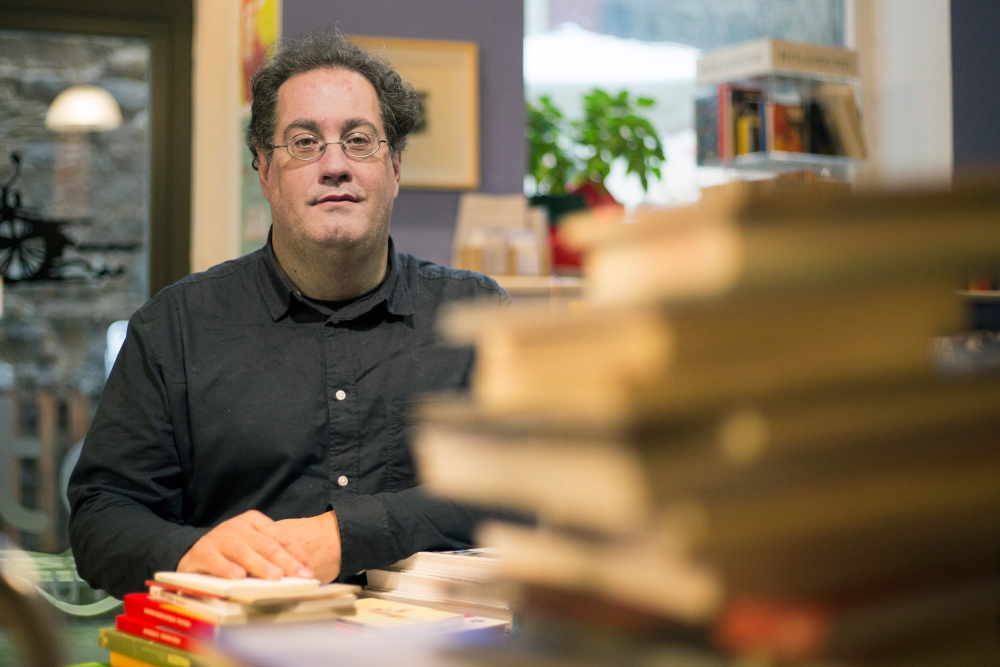
- César de Vicente (Madrid, 1964) has worked on editions of works by Herbert Marcuse, Günther Anders or Erwin Piscator. He participates in the Critical Documentation Center group and published last year The Revolution of 1918-1919. Germany and radical socialism (Revolution of 1918-1919). Germany and radical socialism) with the editorial Catarata. Coinciding with the centenary of the German revolution, the Geronimo Institute of Ustariz invited the bookstore Katakrak of Pamplona to present its book.

Why has the German Revolution had so little presence on its centenary?
It is true that their presence outside Germany has been very low. In Germany this has not been the case. In Berlin, for example, a programme has been carried out from November to March, almost every day with colloquia or conferences. The city has witnessed the chronology of the centenary with the placement of train wagons. Articles on the revolution are being published in the local press.
What is the problem with this revolution? The most obvious reason is that the revolution didn't win. Moreover, the rise of what Nazism would be began after the crushing of the revolution. And that eclipsed everything the revolution could say. In addition, it was among the revolution of 1917. And in the story of social democracy he has systematically shut himself down. An appeal is made to interpret it as a confrontation. In addition, the revolution could barely touch the institutions, because it didn't have time.
The other reason is that social democracy represses the revolution: with violence, in a despicable way, inventing lies against the Spartaquists and systematically. Where revolutionaries have attacked Manu Militari. And because he could not come with soldiers from the First World War (who had arrived demoralized, troyed, tired), he formed Freikorps: units of attack of volunteers.
The massacre was so obvious that it cannot be passed on to history. And those who have mastered German historiography.

As Social Democrats have been, they couldn't count, work, investigate what happened in 1918-1919. That is why he is also refusing to see it happen.
That is why it has also been the centenary that has revived the revolution. Moreover, if they had not murdered Rosa Luxembourg and Karl Liebknecht, we would probably have no idea of the revolution.
In the book you start talking about the state that Bismarck thinks in the 19th century. How the Social Democratic Party (SPD) accepts Bismarck’s rules to enter the political game. And how to manage that state, the SPD is never going to stand for a revolution.
Yes. Despite the fact that for years there were hard clashes between Bismarck's power and the SPD (e.g. unlawful practices), there was actually a pact. Bismarck asked: He could follow “in power” if faced with his main problem, the SPD, he was led by certain issues. At the same time, it was the reading made by the SPD: “Bismarck has surrendered without a brutal confrontation, except for strikes. Therefore, there is no need for a revolution to change things.”
Of course, you can get requests from power, if they are reformist demands. But here's a confusion that Luxembourg made clear: what is reform and what is revolution. Because revolution is not a violent transformation of society, and reform is not a gradual and peaceful transformation. The problem is that reform does not transform society. The pact is what is there. The reform says: we all give up and we will all be satisfied. What is happening is that the demands of all are not met with reform. Because the demands at the origin of the labour, communist or anarchist movement are not met with the statue of Bismarck.
And yet, it seems that through reformist changes you are getting the requirements met. You can move from the monarchy to the republic, for example. And if you see it like this, you don't want the revolution at all. What's more: if somebody starts the revolution, they'll liquidate it.
The internal breakdown of social democracy was between those who supported the World War and those who did not. But did this break not come before? Were they not at least two antagonistic projects within the SPD since 1905 in Russia?
If there was no war, there would be a great break. But let's go before. The European Social Democrat parties agreed not to participate in the war. At the beginning of the war, however, they supported the war: the murder of the German Social Democrat by the Belgian Social Democrat. But there is another important issue: Socialdemocracy accepted colonialism. Why? Because it was good for the German workers. This led to a contradiction that could not be maintained. It was basically said that it was good to put the worker in Congo in a colonial way too. This could not last long.
Rosa Luxembourg denounced that part of the capital accumulation was based on imperialism. And, therefore, I believe that this division was caused by war within socialdemocracy by imperialism.
art “Stefan Zweig wrote the work Geremias. Premiered in Switzerland. The message was: war is horrible, let the enemy come in because otherwise they will destroy us. It was a 1916 work. The Great War showed that the bourgeois project was not viable: progress was multiplied but misery increased for most people. With more wealth, more misery. The war broke out the social system, put an end to the bourgeois system. And from the front came the dead, the maimed and the madmen. When they left they were sold the victory of the Kaiser and the greatness of Germany”